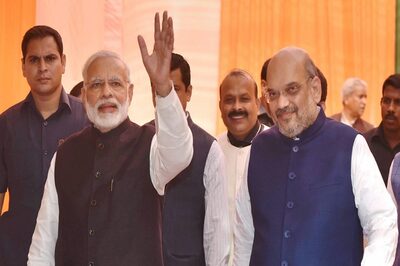
views
Islamabad: Amidst strains between the civilian government and the military, Pakistan Army chief General Ashfaq Parvez Kayani was conspicuous by his absence at an official dinner hosted on Saturday by President Asif Ali Zardari.
The powerful army chief stayed away from the dinner hosted by Zardari in honour of China's top diplomat, State Councillor Dai Bingguo, official sources said.
According to sources, Kayani was among those invited to the event.
Kayani and other senior officers of the army's General Headquarters did not attend another banquet hosted on Friday by Prime Minister Yousuf Raza Gilani for Dai and his entourage.
However, Joint Chiefs of Staff Committee chairman Gen Khalid Shameem Wynne and the air force and navy chiefs attended the event.
The army chief was invited to Friday's banquet but his office informed the Prime Minister's House that he would be unavailable.
The Chief of General Staff, Lt Gen Waheed Arshad, was to represent Kayani at the event but he could not travel to Islamabad from Rawalpindi as the highway connecting the two cities was blocked people protesting against a shortage of gas.
The presence or absence of the top military leadership at events organised by the civilian government is closely watched by the media and in political circles, as it is considered a reflection of the state of relations between the army and the government.
Sharp differences have emerged between the government and the army over an alleged memo that sought American help to stave off a feared coup in Pakistan after the US raid that killed Osama bin Laden in May.
The government has said President Zardari and Prime Minister Gilani played no role in drafting or delivering the memo to former US military chief Admiral Mike Mullen.
The chiefs of the army and Inter-Services Intelligence have said there is adequate evidence that the memo exists.
They have asked the Supreme Court, which has admitted several petitions seeking a probe into the Memogate scandal, to order an investigation.
The government has challenged the apex court's jurisdiction to hear these petitions, saying the matter is being investigated by a parliamentary panel.
On Thursday, Gilani sharply criticised the army, saying it was unacceptable for the institution to act as a "state within a state".
He also questioned the army's failure to detect bin Laden's presence in Pakistan.
In an apparent response to Gilani's remarks about conspiracies being hatched against his government, Kayani yesterday said the army will continue to support democracy.
Kayani dispelled speculation about a military takeover. His remarks were welcomed on Saturday by Gilani.




















Comments
0 comment